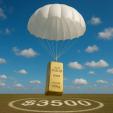Gold, Equity Valuations, and the Fed
Santa Monica (Jan 29) One popular indicator of stock-market valuation – the price-to-earnings ratio (the P/E) on the S&P 500 stock-market index – is currently near 16. This is well above the five-year and ten-year averages – and solidly in historical bubble territory.
Even if increased bubble-talk is premature or misplaced, it is hard to imagine an imminent return to economic prosperity and “boom” times sufficient to justify today’s lofty stock-market valuations.
Indeed, few stock-market strategists and business economists expect earnings growth in the next year or two sufficient to justify ever-higher equity prices – such that equities would continue to outperform gold, as they have in the past few years.
A Turning Point for the Fed
After its mid-December FOMC policy-setting meeting, Federal Reserve Chair Ben Bernanke announced the central bank would taper its program of bond purchases beginning this January – and odds are the Fed will continue shrinking its program of quantitative easing in the months ahead.
Fortunately, for gold investors, the Fed’s policy options present a win-win: If the economy falters a postponement of tapering would likely be greeted favorably by gold traders and investors.
On the other hand, if the economy shows signs of strengthening, a continuation or acceleration of tapering could be a plus for gold as inflation expectations begin to rise and increased credit demand boosts interest rates and short-circuits world equity markets. In fact, judging from recent stock-market and gold-price performance, this scenario may already be underway.
Moreover, even if the Fed further curtails its program of quantitative easing, reducing its bond purchases by an additional $10 billion each month, it will nevertheless have increased its balance sheet (which is the electronic version of printing money) by $900 billion during the 2014 calendar year – and, in the five years since the 2008 financial crisis, the Fed will have expanded its balance sheet by some 400 percent.
If this isn’t inflationary, I don’t know what is. Eventually, these birds will come home to roost.










